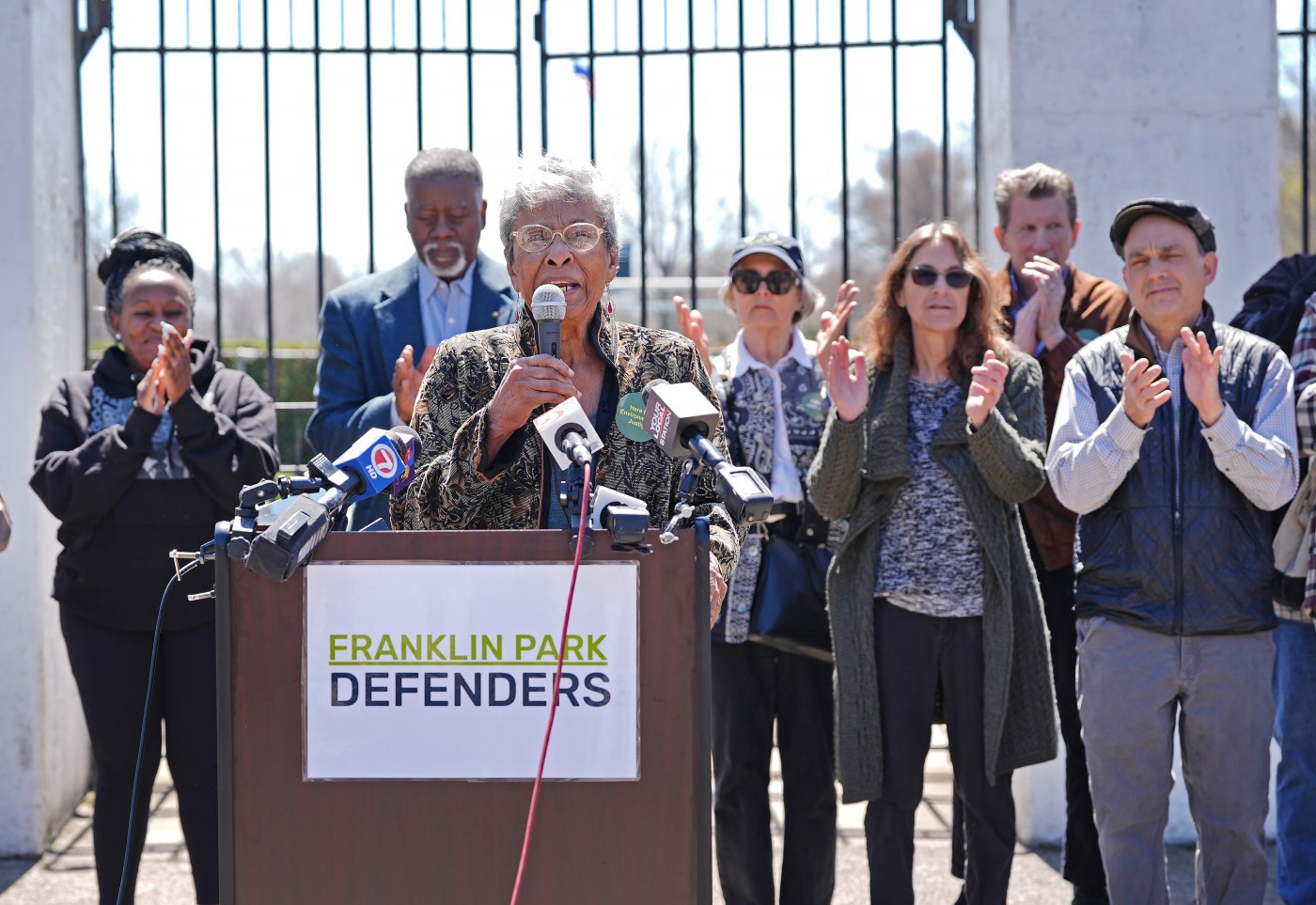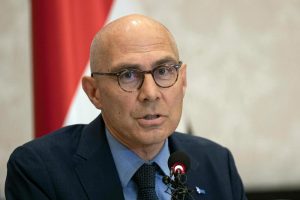
Neighbors vow to keep fighting Boston, pro soccer team’s plans for White Stadium redevelopment
Neighbors and park advocates who unsuccessfully sought to stall the city and a professional women’s soccer team’s plans to restore and use Franklin Park’s White Stadium vowed to keep fighting both parties in court.
Representatives from the Emerald Necklace Conservancy and a group of residents who joined their lawsuit against the city and Boston Unity Soccer Partners gathered for a Tuesday press conference at White Stadium, where they maintained that plans for its reuse constitute an “unconstitutional privatization” of the land.
Undeterred by a Suffolk Superior Court judge’s decision last month to throw out their push for an injunction intended to halt the project, the plaintiffs announced their plans to continue the lawsuit, and proceed to legal discovery, “to reveal the many details of this soccer stadium plan that have not been made public,” as described by Egleston Square resident Renee Welch.
“We’re going to continue to challenge the city,” said plaintiff Louis Elisa, a former regional director for the Federal Emergency Management Agency and president of Roxbury’s Garrison Trotter Neighborhood Association.
The plans, he said, would “take away the space and activities that are here for the community, that was created for people to have a respite to come away from the challenges of their urban community.”
While the group was “disappointed” by the judge’s ruling, Welch said, it “did not affect the underlying lawsuit.”
“In the weeks since the judgment, the city has moved forward aggressively, holding several public meetings on the project, where concerns of residents have continued to go unaddressed,” Welch said. “Instead, city officials have addressed residents’ concerns as frivolous.”
On the evening of the judge’s ruling, Mayor Michelle Wu said she was “thrilled to see the court’s clear ruling that this frivolous lawsuit from the Emerald Necklace Conservancy must not block our ongoing community engagement to deliver a generational investment in White Stadium and Franklin Park.”
Related Articles
Boston Mayor Michelle Wu fires head of commission that criticized her administration
Late-night Back Bay ‘dangerous’ drag racing is ‘not an isolated incident’ in Boston, Councilor says
Boston fire commissioner, union at odds over City Council push to slash cadet training
Boston city councilor sounds alarm over decision to allow unpermitted marathon with 200 runners
Boston Mayor Wu appoints city’s first chief climate officer at $195,000 a year
While the mayor has stated that the planned renovations, which per the lawsuit constitute a $30 million investment from Boston Unity and $50 million from the city, will benefit both the new soccer team and the community, the plaintiffs aren’t buying it and remain convinced that Boston Public Schools student-athletes will be displaced to accommodate the professional games and practices.
The plaintiffs also reiterated their skepticism that most pro soccer game attendees will opt for public transportation, pointing to White Stadium’s small parking lot, saying that the planned redevelopment will instead lead to traffic congestion and public safety issues stemming from spillover parking on neighborhood streets.
Their main point of contention, however, revolves around the purported privatization of White Stadium, a claim the mayor has disputed in the past as “either a misunderstanding or a misrepresentation.”
The project, according to the lawsuit, would “illegally transfer the public trust lands” held by the beneficiaries of the White Fund Trust “to private parties, ensuring extensive, exclusive use” of those lands by a private party for the operation of a professional sports team.
“This idea that they want to put a private soccer league in White Stadium after 35 years of neglect worries me because if that soil is still sitting there and they’ve not cleaned the park and done the basic maintenance, how do we believe now that they’re going to find $50 million?” Elisa said.
Boston Unity Soccer Partners, an all-female ownership group, was the only respondent to the city’s request for proposals for White Stadium and won an expansion bid in September to become the National Women’s Soccer League’s 15th team.
It plans to start playing in the renovated stadium in the spring of 2026. The group, which includes Boston Globe CEO Linda Pizzuti Henry as one of its investors, has said that construction, which includes adding 1,000 seats to the 10,000 seat stadium, would generate 500 jobs and that 300 jobs will be created permanently.
“Many of us here love soccer,” Karen Mauney-Brodek, president of the Emerald Necklace Conservancy, a nonprofit park advocacy group, said. “We think Boston would be well-served to have a soccer team here, but not in this park that is so essential to the health and well-being and the needs of the Boston Public School students.”
In a Tuesday statement, Boston Unity Soccer Partners said the judge’s ruling last month indicated “that there is no legal basis to challenge this public-private-community partnership to revitalize White Stadium.”
The group further described the “sentiments” of Emerald Necklace Conservancy as being inconsistent with the community feedback it has solicited since starting the stadium redevelopment process a year and a half ago.
“We continue to invite the community at large to offer constructive feedback on the proposed plans to and to participate in the many upcoming public meetings,” the Boston Unity statement said. “We are proud to be part of a project that honors the legacy of White Stadium so it will continue to serve as a cornerstone of our community for generations to come.”
The mayor’s office did not respond to a request for comment.
White Stadium (Nancy Lane/Boston Herald)


